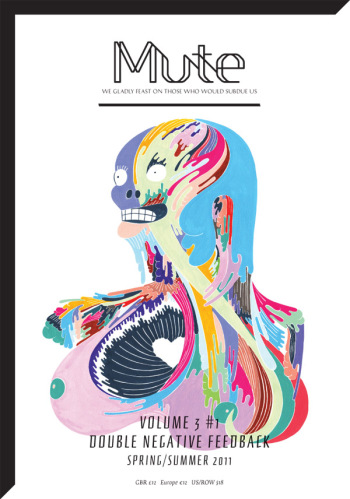Mute, 3(1): Double Negative Feedback (2011)
Filed under magazine | Tags: · architecture, art, capitalism, contemporary art, cultural politics, economics, financial crisis, journalism, music, neoliberalism, networks, politics, uk, wikileaks

“‘Double Negative Feedback’ expresses the hope that the chaos unleashed by the cybernetic loops of financialisation, post-Fordist production and networked life might not only be entropic and exploitative. The noise generated by ‘positive feedback’ also takes the form of the explosions we are seeing in the Arab world, the anti-disciplinary uses of cybernetic control systems, the ‘shared precarity’ of compositional improvising, and the ripples of a political organising that no longer assumes a common identity but instead acknowledges our common vulnerability. This issue scouts out such double-negative loops in a landscape dominated by the relentless, if often misfiring attempt to put feedback to work.”
Edited by Josephine Berry Slater
Publisher Mute, London, June 2011
Freiheit vor Ort: Handbuch kommunale Netzpolitik (2011) [German]
Filed under book | Tags: · blogging, commons, copyright, creative commons, floss, free software, networks, open access, open data, open government, open source, politics, web

Freiheit beginnt vor Ort. Dies gilt gerade auch für Freiheit in der digitalen Gesellschaft. In acht Kapiteln widmen sich fünfzehn AutorInnen kommunaler Netzpolitik in all ihren Facetten: von Freien Funknetzen, Creative Commons, offenen Lehrunterlagen, Open Source Software, Blogs und Wikis bis zu Open Government, Open Data und dem Web als Kompetenz- und Forschungsfeld.
Im Anschluss an die Beiträge kommen in Interviews Menschen zu Wort, die global oder lokal in den genannten Bereichen tätig sind, u.a. der Gründer der Free Software Foundation, Richard Stallman, Creative-Commons-Initiator Lawrence Lessig oder Wendy Hall, Mitinitiatorin der neuen Studien- und Forschungsrichtung Webwissenschaften.
Konkrete Projektvorschläge schließen die Kapitel ab. Sie richten sich an lokale EntscheidungsträgerInnen und netzpolitisch Interessierte, die die Potentiale digitaler Technologien für Wirtschaft, Bildung, Kunst und Kultur ausschöpfen möchten. Vor Ort.
Bearbeitete Neuauflage des Bandes Freie Netze. Freies Wissen, Echo media verlag, Wien 2007.
Editors: Leonhard Dobusch, Christian Forsterleitner, Manuela Hiesmair
Publisher: Open Source Press, München, 2011
ISBN: 978-3-941841-40-6
266 pages
Licensed under Creative Commons License BY-SA 2.0 AT
Yochai Benkler: A Free Irresponsible Press: Wikileaks and the Battle Over the Soul of the Networked Fourth Estate (draft, 2011)
Filed under paper | Tags: · internet, journalism, mass media, network culture, networks, politics, wikileaks
A study of the events surrounding the Wikileaks document releases in 2010 provides a rich set of insights about the weaknesses and sources of resilience of the emerging networked fourth estate. It marks the emergence of a new model of watchdog function, one that is neither purely networked nor purely traditional, but is rather a mutualistic interaction between the two. It identifies the peculiar risks to, and sources of resilience of, the networked fourth estate in a multidimensional system of expression and restraint, and suggests the need to resolve a major potential vulnerability—the extralegal cooperation between the government and private infrastructure companies to restrict speech without being bound by the constraints of legality. Finally, it offers a richly detailed event study of the complexity of the emerging networked fourth estate, and the interaction, both constructive and destructive, between the surviving elements of the traditional model and the emerging elements of the new. It teaches us that the traditional, managerial-professional sources of responsibility in a free press function imperfectly under present market conditions, while the distributed models of mutual criticism and universal skeptical reading, so typical of the Net, are far from powerless to deliver effective criticism and self-correction where necessary. The future likely is, as the Guardian described its own experience with Wikileaks, “a new model of co-operation,” between surviving elements of the traditional, mass-mediated fourth estate, and its emerging networked models. The transition to this new model will likely be anything but smooth.
Working Paper of article forthcoming in the Harvard Civil Rights – Civil Liberties Law Review.
8 February 2011 version.
66 pages
PDF
Update: PDF (current version)

